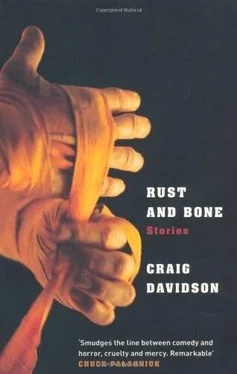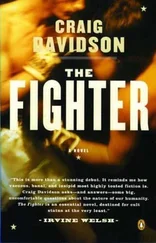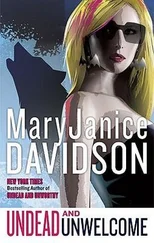“Know what I see?” The kid points at Bua. “Skin and bones and arms and legs.”
“Then you’re only looking, not seeing.”
“Let me know when it’s time to snatch the pebble out of your hand, sensei.”
Set him off on the speed bag. Hand speed’s decent, and the kid’s got power: the leather bag snaps hard against its ringed-iron mooring. He starts mugging, beating a rat-a-tat rhythm on the bag, bringing one knee up and then the other, two pistons in perfect cadence, lisping, “I’m the champeen, the greatest, the king.”
“Pop the bag.”
The kid stalks over to a tan-colored heavy bag suspended from a crossbeam and tees off. He rips a half-dozen body shots into the two-hundred-pound bag, causing it to buck on its chain. He sways at the hip in bob-and-weave style, shouldering the bag, throwing hooks and short right hands, falling in line with its rhythm before stabbing four left hooks and following with an overhand right.
The kid forces a yawn. “Okay, boss?”
“It’ll do.”
After a half-hour of rope skipping and shadowboxing I tell him to stop. Brew a pot of oolong tea and pour cups with lemon. We sit on the ring apron and watch Bua run footwork combos in front of a full-length mirror.
“Moe only sends me hardasses,” I say. “What’s your story?”
The kid wipes his face with the towel. “Moe thinks I’m a hardass?”
“You wouldn’t be here otherwise.”
“Well,” the kid says, “could be he thinks I don’t train hard enough.”
“Why would he think that?”
“No idea. I win fights.”
“People think you win a fight in the ring,” I tell him. “But you know where the big fights are won? Right here. In the gym and on the road.”
“I know, I know.” The kid’s heard it all before.
“Moe says you brawl like a Viking. Says you fight with your dick instead of your head.”
“He told you all this already, what you asking me for?”
I nod over at Bua. “That kid’s won over a hundred fights. Started when he was thirteen, fights twenty times a year. He’s not a crowd favorite—he’s too smart for that. He doesn’t go out to make a show. He goes out to get a job done and absorb the least punishment possible.”
Bua’s feet flicker across a vulcanized floormat, body circling to the left, feinting, ducking away, back to the right. The squeak of his shoes on the rubber and his breath coming into an even rhythm. The boy’s so quick he could fight in a rainstorm and stay bone dry.
“I don’t know where Sucharit found him,” I say. “Probably on the streets. He doesn’t fight for glory. He fights for a paycheck. The boy trains hard and fights for the money because he knows, even at his age, it could all be taken away.”
The kids sips tea, wipes his neck. “I don’t fight for the money, exactly.”
“Then why?”
“I got anger.”
“At who?”
“Don’t know. Everyone. Not all the time, you know, but sometimes … it builds up. This need to hurt, even if it means getting hurt myself. And that’s okay, the way I see it, because everybody stepping into the ring knows the stakes. You accept those stakes, you accept the risk—maybe you’re going to get fed. No, it’s not the money. Fighting, it’s like, therapy .”
Fighters like him are the hardest to train. On one hand, he’s managed to inhibit his natural instinct for survival: he understands he will get hurt, bleed, and doesn’t run from it. Stifling the survival instinct—to continue fighting after being knocked down, to wipe blood out of your eyes and wade back into the fray—is a trick some fighters never master. On the other hand, his anger is dangerous: it’s useless, not to mention foolish, carrying too much fury into the ring. Successful fighters learn to see their opponent as a faceless thing whose weight roughly equals their own, something vertical that must be laid horizontal. But successful fighters respect their opponents: respect their power, their stamina, their will to win. Lack of respect leads to a cocky fighter blinking up into the ring lights as the ref counts him out.
Bua completes his drills and he and Sucharit walk over to the ring. The boy’s body is slick with clean, healthy sweat. He smiles. The bottom front teeth have been punched out.
“Your fighter’s looking good,” I tell Sucharit.
Sucharit frowns: trainers never admit the worth of their fighters, especially in their presence. “He slow,” Sucharit says. “Like he eat lead.” He slaps the boy’s toned stomach. “Hah? You eat lead, hah?”
“I thought he looked slow,” says the kid.
“When’s his next fight?”
“Two wee’,” Sucharit says to me. “Ban’kok.”
“Tell him I say he’s a weak puncher,” the kid says. “Girl arms.”
“He understands fine,” I say. “Quit making an ass.”
“Tell him I got two friends I want him to meet,” the kid goes on, grinning. He holds up his right fist: “Bread.” He holds up the left: “And Butter.”
Sucharit puts his arm around Bua’s shoulder and guides him away. “Goo’ luck training.”
“Why’d you say that?” I say after they’ve gone. “Something in the air?”
“Air’s fine.”
THE MOST WIDESPREAD MISUNDERSTANDING surrounding the death of Johnny “The Kid” Starkley is that I killed him purposefully and maliciously because he questioned my sexuality, called me faggot at the weigh-in. But it had nothing to do with vengeance: I’d been trained to fight until my opponent dropped or the bell went or the ref stepped in. The bell didn’t ring and Ruby Goldstein didn’t step in and Starkley refused to go down so I did as I’d been trained. I didn’t want to kill him. My only intent was to defeat Starkley completely, leave him lying there on the canvas. I wanted him dead to me, dead as a threat. Nietzsche wrote, Every man unfolds himself in fighting. Well, that night in Tupelo, in a ring smelling of sweat and spit and cold adrenaline, I unfolded.
My popularity skyrocketed after the fight. Everyone wanted to ink the “sanctioned murderer” to their card. But by then all the fight had drained out of me. I stared at myself in every passing mirror: nose busted so many times over it couldn’t rightly be called a nose anymore, right eyelid hanging half-masted due to nerve damage, cheeks so scarred they looked like carnival taffy. I understood the same thing could’ve happened to Starkley in a bar or back alley for no payday at all. It’s just, that way it wouldn’t have been on my conscience. I started juicing hard, haunting the Cyclone with the washups and fight bums, stripping down everything I’d built.
My second week in Bangkok I drifted into the Royal Jubilee Palace arena, drawn by crowd buzz and frantic ocarina music, to see my first Muay Thai match. I was mesmerized by the pre-fight rituals, the lean tan bodies, the thrill of men in close combat. The pureness of it all. I knew then I’d never escape. Marvin Hagler spoke for all of us when he said, If they cut my head open, they would find one big boxing glove. That’s all I am. I live it . You can’t outrun this life. Sounds weak, I know, but it’s the truth. Whether it was bred into me or whether I’d always harbored the bent has long ceased to matter.
This morning I’m watching the kid shadowbox in a wash of hot, dusty sunlight pouring through slats in the long-house roof. The kid’s a bully: in sparring sessions he’ll remind you of a vintage Foreman, shoving his partner around before tagging him with jabs, then a hook to the body, finishing with an uppercut flush on the knockout button. Shots so hard the other guy’s eyes fog despite the headgear and oversize gloves.
Problem is he can’t leave his fight in the ring. Type of alpha male who’ll walk into a bar and knock the bouncer’s teeth out to prove he’s the toughest bastard in the place. He’s got serious heart: takes sparring shots so wicked they’d cripple a bear, eats up mile after mile of road like he’s starving, punches a dent in the heavy bag. But there’s too much of the animal in him.
Читать дальше












